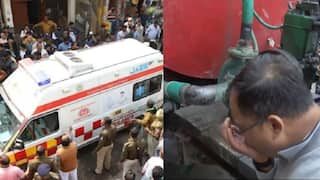As Tremors Shake Northern India, Here Are The Things To Keep In Mind During An Earthquake
When and where an earthquake will occur is impossible to predict. Nonetheless, there are steps you can take before, during, and after a quake to help you stay safe and recover quickly.

Earthquakes are among the most devastating natural disasters that can strike the Earth's surface, causing widespread destruction and loss of life. The world has not forgotten the destruction wrought by last month's earthquake in Turkiye and Syria.
Strong earthquake tremors were felt in New Delhi, Punjab, and other parts of North India on Tuesday night around 10:17 pm, with the epicentre 90 kilometres from Kalafgan in Afghanistan. According to reports, the 6.6-magnitude earthquake struck Turkmenistan, India, Kazakhstan, Pakistan, Tajikistan, Uzbekistan, China, Afghanistan, and Kyrgyzstan. The tremors, which lasted nearly a minute, were felt across northern India, including Uttarakhand, J&K, Delhi, and Uttar Pradesh.
While a large earthquake can wreak havoc on people and structures. Some earthquake safety precautions should be taken in order to survive such a disaster. Being prepared and knowing what to do during an earthquake can make all the difference in minimizing injuries and saving lives.
Here Are Some Things To Keep In Mind During An Earthquake:
Drop, Cover, and Hold On: The first thing to do during an earthquake is to drop down to the ground, take cover under a sturdy desk or table, and hold on until the shaking stops. If there is no sturdy furniture nearby, crouch down against an interior wall and cover your head and neck with your arms.
Stay Indoors: It is usually safer to stay inside during an earthquake, as trying to leave a building during an earthquake can be dangerous. If you are outside, move away from buildings, trees, streetlights, and power lines.
Stay Calm: It can be frightening when the ground shakes but try to remain calm and reassure others around you, especially children.
Check for Injuries: After the shaking has stopped, check yourself and those around you for injuries. If anyone is injured, seek medical attention immediately.
Evacuate If Necessary: If there is a fire, gas leak, or other immediate danger, evacuate the building immediately, using stairs rather than elevators.
Listen for Updates: Listen to the radio or television for updates and instructions from local authorities. If you are in a tsunami-prone area, move to higher ground immediately.
Inspect Your Home: After the earthquake, inspect your home for damage, including cracks in walls or ceilings, gas leaks, and electrical damage. If you smell gas, turn off the gas valve and leave the house immediately.
Stay Away From Damaged Areas: If your home or building has been damaged, stay away from damaged areas, as there may be a risk of collapse.
Prepare An Emergency Kit: Keep an emergency kit in your home, including water, non-perishable food, first aid supplies, flashlights, and a battery-operated radio.
The following items should be kept on hand in an earthquake emergency kit: water (one gallon per person per day for several days, drinking and sanitation), food (at least a several-day supply of non-perishable food), a battery-operated or hand-cranked radio, and flashlight.
Practice Earthquake Drills: Practice earthquake drills with your family or coworkers to ensure everyone knows what to do in case of an earthquake.
(With Inputs from the United States' National Centers for Disease Control and Prevention)
Related Video
Vande Bharat: India’s First Vande Bharat Sleeper Train to Run Between Guwahati and Kolkata





































